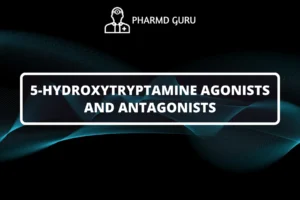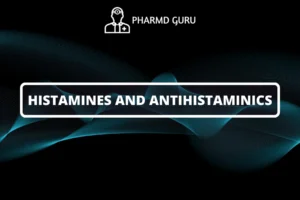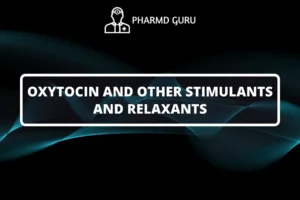THYROID AND ANTITHYROID DRUGS
The thyroid gland plays a crucial role in regulating various physiological processes in the body by producing hormones that control metabolism, growth, and development. However, sometimes the thyroid gland may become overactive or underactive, leading to imbalances in hormone levels. Thyroid drugs and antithyroid drugs are pharmacological agents used to manage these thyroid disorders and restore the normal functioning of the thyroid gland. In this article, we will explore the pharmacology of thyroid and antithyroid drugs, their mechanisms of action, common types of these medications, and their therapeutic applications.
SCROLL DOWN TO THE BOTTOM OF THIS PAGE FOR ACTUAL NOTES.
TABLE OF CONTENTS:
- Introduction
- Thyroid Hormones and Their Functions
- Hyperthyroidism and Hypothyroidism
- Mechanisms of Action
- Types of Thyroid and Antithyroid Drugs
- Pharmacokinetics
- Therapeutic Applications
- Considerations for Use
Introduction
The thyroid gland, located in the neck, produces hormones known as thyroxine (T4) and triiodothyronine (T3), which regulate metabolism and influence the function of various organs and tissues in the body. When the thyroid gland becomes overactive (hyperthyroidism) or underactive (hypothyroidism), it can result in a range of symptoms and health complications.
Thyroid Hormones and Their Functions
Thyroid hormones, T4 and T3, play critical roles in the body, including:
- Metabolism Regulation: Thyroid hormones help regulate the body’s metabolic rate, influencing energy production, utilization, and expenditure.
- Growth and Development: Thyroid hormones are essential for proper growth and development, particularly during infancy and childhood.
- Cardiovascular Function: Thyroid hormones influence heart rate, cardiac output, and blood pressure regulation.
- Central Nervous System Function: Thyroid hormones affect brain development, cognition, and overall central nervous system function.
Hyperthyroidism and Hypothyroidism
Hyperthyroidism is a condition characterized by an overactive thyroid gland, resulting in excessive production of thyroid hormones. This can lead to symptoms such as weight loss, rapid heartbeat, tremors, and anxiety.
Hypothyroidism, on the other hand, occurs when the thyroid gland is underactive, leading to insufficient production of thyroid hormones. Symptoms of hypothyroidism may include fatigue, weight gain, cold intolerance, and depression.
Mechanisms of Action
Thyroid drugs and antithyroid drugs exert their effects through different mechanisms:
- Thyroid Hormone Replacement: Thyroid drugs, such as levothyroxine, are synthetic versions of thyroid hormones that supplement or replace the deficient thyroid hormones in individuals with hypothyroidism.
- Thyroid Hormone Inhibition: Antithyroid drugs, such as methimazole and propylthiouracil (PTU), work by inhibiting the production of thyroid hormones, thus reducing their levels in individuals with hyperthyroidism.
Types of Thyroid and Antithyroid Drugs
- Thyroid Hormone Replacement: Levothyroxine (T4) is the most commonly prescribed thyroid hormone replacement medication. It is converted to the active form, T3, in the body and helps restore thyroid hormone levels in individuals with hypothyroidism.
- Antithyroid Drugs: Methimazole and PTU are widely used antithyroid medications. They inhibit the production of thyroid hormones by interfering with the synthesis of thyroid hormones in the thyroid gland.
Pharmacokinetics
The absorption, distribution, metabolism, and excretion of thyroid and antithyroid drugs vary. Levothyroxine is well absorbed from the gastrointestinal tract and undergoes conversion to T3 in peripheral tissues. Antithyroid drugs are also absorbed well after oral administration and are metabolized in the liver.
Therapeutic Applications
- Hypothyroidism Treatment: Thyroid hormone replacement therapy is the primary treatment for hypothyroidism, aiming to restore thyroid hormone levels and alleviate symptoms.
- Hyperthyroidism Management: Antithyroid drugs are used to manage hyperthyroidism by reducing the production of thyroid hormones and controlling symptoms.
Considerations for Use
When using thyroid and antithyroid drugs, it is important to consider:
- Individualized Dosage: The dosage of thyroid medications should be individualized based on the patient’s specific thyroid hormone levels and clinical response.
- Monitoring: Regular monitoring of thyroid hormone levels is necessary to adjust the dosage and ensure optimal treatment outcomes.
- Adverse Effects: Thyroid and antithyroid drugs can have potential side effects, such as allergic reactions, skin rash, and changes in heart rate. Close monitoring is essential to identify and manage these effects.
ACTUAL NOTES:




